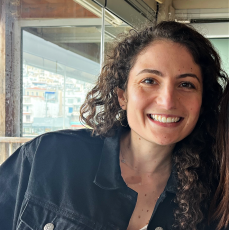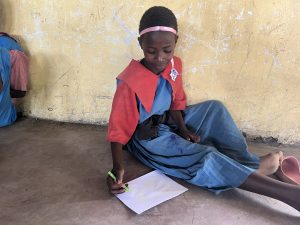In my final few weeks in Kenya, CPI led its last field activity for the summer called “Holiday Exchange. At Holiday Exchange, the IlChamus and Pokot children who had attended the peace camp in June were reunited for another multi-day camp during the August (school) holiday.
As a refresher, peace camp (held on the Pokot side) introduced children from the conflicting tribes and sparked friendship through light-hearted games and team building exercises. Additionally, their parents had the chance to interact across tribal boundaries (some for the first time) because of their children’s friendship. A continuation of peace camp, Holiday Exchange is designed to strengthen these connections through activities more directly focused on conflict resolution. It was held on the IlChamus side, which exemplifies the “exchange” element.
Holiday Exchange was eye-opening for me—for positive AND negative reasons. I’ll explain.
CPI Deputy Director Monica Kinyua facilitated two powerful self-exploratory activities with the kids. In the first, they were asked to draw their family trees. In my opinion, the goal of this activity was for kids to explore their identity—their role in their family systems and their relationship with their family members. It was as much an exercise of individual expression as it was to recognize the similarities with their friends of the other tribe.
The second activity explored peace and conflict— not necessarily in relation to the tribal tension, but as concepts. Because I am specifically fascinated by how this conflict affects members of society differently, I was curious to see how children perceive these concepts. In the first part of the activity, Monica spoke to the kids about the wide spectrum of emotions, explaining that joy, love, excitement, anger, and hurt are all equally valid.
When she went on to talk about healthy vs. unhealthy ways to react to anger and hurt, the kids were enthralled. I predict that many children had never seen an alternative way to express these emotions besides acting violently. After, they were asked to draw depictions of conflict and peace. In some of their pictures of conflict, I saw the resemblance of guns. At that age, I’m not sure I knew what a gun looked like. This was one of the moments this summer which stopped me in my tracks and reminded me of the stark contrast between my privileged upbringing to that of these children.
Around 7am of the 3rd day of Holiday Exchange, I received a text in the CPI group chat that camp was delayed so we could sleep in… Immediately I knew something was off, since we never slept in. In the next few hours, I learned that there had been a cattle raid in the middle of the night which ended in two IlChamus fatalities. Though the raid occurred far from where the camp was held, CPI and community leadership swiftly decided that the children should return to their respective homes. We ended Holiday Exchange two days early.
It was a solemn morning for all of us–solemn not only because of the fatalities but also because this was the first time in over a year that an incident had occurred. From my perspective, this does NOT mean that CPI’s peacebuilding progress is lost, or even that it has backtracked. It is important to remember that the perpetrators of most raids are not part of the communities whom CPI works with. Instead, they are nomadic “rogue warriors” who live separately from the rest. They are the small minority of (mainly Pokot) aggressors.
So, while this incident was tragic and disheartening, it also comes with a new opportunity for CPI. I would encourage CPI to find ways to identify and meet with these rogue warriors by leveraging the relationships they have with local chiefs, police, field monitors – anyone who has access to them. CPI may need to develop ingenuitive and specific programming to address the unique vulnerabilities of this group. However, with CPI’s strong track record and the immense esteem they have garnered from the Pokot and IlChamus, I am confident that CPI is up to the challenge.
Posted By Olivia Landau
Posted Aug 12th, 2024




1 Comment
Iain Guest
August 15, 2024
How unfortunate that this incident put an end to the holiday exchange. I’m sure you’re right that the perpetrators were rogue fighters who are not living in the communities where CPI has worked. But this is a reminder of the deep structural tensions that exist within these pastoralist communities – as a result of their way of life, threats to the environment etc. This seems to call for deep and extensive changes in behavior, policy etc across the entire society, which leaves me wondering whether building ties between individual communities will work. There was some evidence last year during the conflict between Pokot and samburu that the friendships built by CPI can hold, even in open conflict. Let’s hope the same applies in this case.